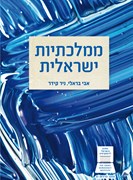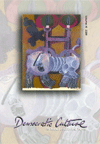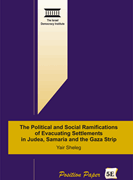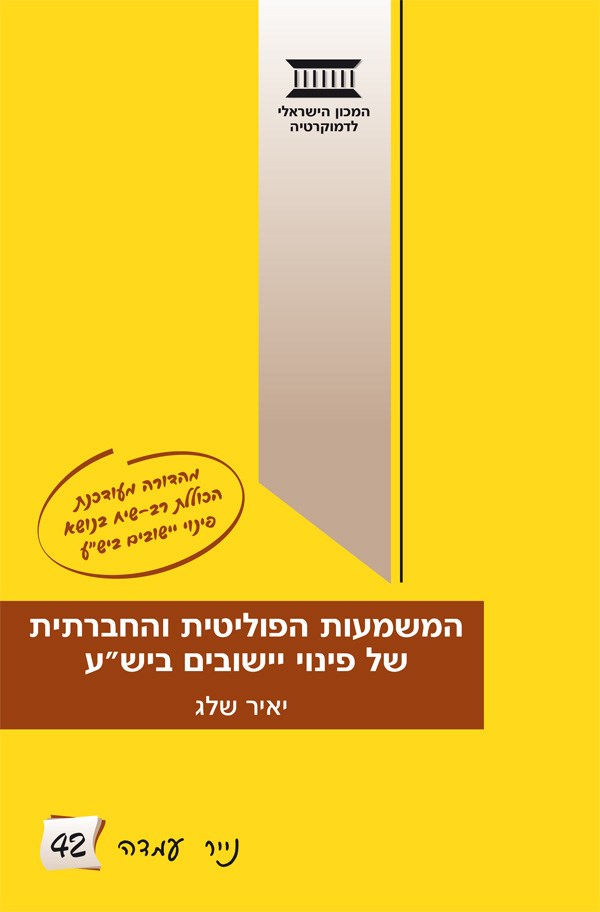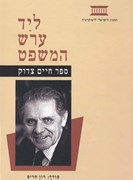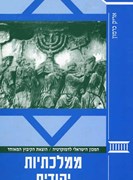

Publications Regarding Zionism
Articles

The Two Coalitions Israel Needs Now
Written By: Yohanan Plesner
It is increasingly clear that Israel’s future depends on the forging of two coalitions. One is a multinational alliance determined to turn the Palestinian issue from a driver of conflict into an engine of peace. The other, is an internal Israeli coalition ready to pursue a series of bold social, economic, and political reforms.
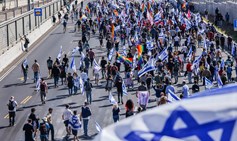
Fighting the Judicial Reform for Zionism
Written By: Dr. Amir Fuchs
The battle against the judicial overhaul is not being waged only to safeguard democracy, it is also a fight to preserve Zionism itself.
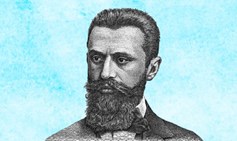
Reimagining Zionism for the 21st Century
Written By: Adv. Shlomit Ravitsky Tur-Paz
Based on her address to a special event in Basel, Switzerland, marking the 125th anniversary of the first Zionist Congress, Shlomit Ravitsky Tur-Paz, calls for today’s generation to view Zionism not only as a vehicle for building a state, but also for enhancing and enriching Israeli society.

What Is the Relation Between Anti-Zionism and Antisemitism?
Written By: Dr. Shany Mor
The terms antisemitism, anti-Zionism, and criticism can be described as three different phenomena - Dr. Shany Mor explains

Privatizing Religion
Written By: Yair Ettinger
Yair Ettinger discerns between different streams of Religious-Zionist Jews in Israeli society, and analyzes how these schisms play out in the socio-political arena. This piece was originally published by Brookings.

Religious Zionism’s Budding Romance with Capitalism
Written By: Yair Sheleg
Religious Zionism is based on a nationalistic, even hawkish, position on foreign affairs. Such an ethos, especially in the Middle East, thus demands a great willingness to sacrifice. However, this desire to serve the greater good can only be maintained over time if a sense of solidarity and mutual responsibility unites the members of Israeli society.

The IDF’s Fighting Ethos in the Wake of Operation Protective Edge
Written By: Yohanan Plesner
IDI President Yohanan Plesner stresses the need to ensure that the Israel Defense Forces remains at the heart of the Zionist consensus so as to enable it to continue to be the army of all citizens of Israel.
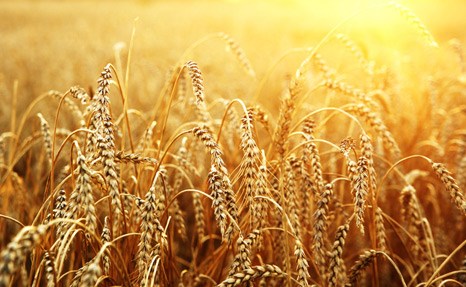
Shmita: Rest, Share, Release
Written By: Prof. Yedidia Z. Stern
An exploration of the existential, social, and economic dimensions of the Shmita year, that calls for bringing together social, moral, cultural, religious and national forces to implement the idea of Shmita in non-agricultural and national contexts in Israel.
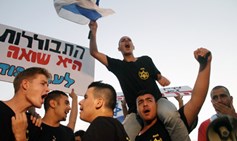
On Intermarriage, Judaism, and Democracy in Israel
Written By: Benjamin (Benny) Lau
Rabbi Dr. Benjamin Lau shares thoughts on the tension between Judaism and democracy, in response to the public protests against the marriage of a Jewish woman who converted to Islam and an Israeli Arab.

On Operation Protective Edge, Justice, Law, and Victory
Written By: Admiral (Res.) Amichay (Ami) Ayalon
Admiral Ami Ayalon asserts that the winner of today's wars is the side whose story is perceived as just, and argues that without a diplomatic track, Israel cannot win the war, even if the war is justified and Israel adheres to international law in the face of terrorists who violate it.

Shavuot in Israel: A Celebration of Torah or First Fruits?
Written By: Hizky Shoham
Dr. Hizky Shoham explores the multiple identities of the holiday of Shavuot, which began as an agricultural festival, was transformed into the "holiday of the giving of the Torah," and is most often commemorated as a celebration of Torah in today's Israel—by secular and observant Jews alike.
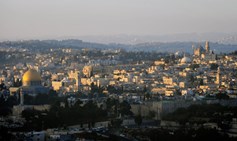
A Royal Sanctuary: Three Scenes for Jerusalem Day
Rabbi Dr. Benjamin (Benny) Lau presents three snapshots from different times and places, reflecting on a city that combines ancient and modern, sacred and secular, eternal truths and ordinary life.

My Jerusalem: Thoughts for Jerusalem Day
Written By: Prof. Mordechai Kremnitzer
IDI Vice President Prof. Mordechai Kremnitzer shares thoughts on Jerusalem, which symbolizes what is most beautiful and exalted in Jewish culture: the commitment to law and morality, to justice and mercy.

Public Opinion: Is Israel Independence Day a Holiday?
Written By: Mr. Chanan Cohen
Do Jewish and Arab citizens of Israel see Yom Ha'atzmaut as a holiday? Do perceptions among Jews vary depending upon level of religiosity or position on the right-left political spectrum? Find out in this Mini-Survey from IDI's Guttman Center.

On Leadership and Responsibility: The Lessons of the Purim Story
Written By: Shira Ruderman, Benjamin (Benny) Lau
Rabbi Dr. Benny Lau and Shira Ruderman, Israel Director of the Ruderman Family Foundation, share thoughts on the Purim story, leadership, responsibility, and repair of the world.

Is "Israeli" a Nationality?
Written By: Jay Ruderman, Prof. Yedidia Z. Stern
Should the State of Israel recognize "Israeli" as a nationality? IDI Vice President Prof. Yedidia Stern and Jay Ruderman assert that it is imperative for the State of Israel to continue distinguishing between citizenship and nationality.
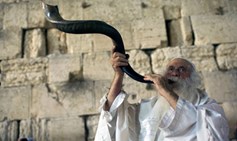
Standing before God: Reflections on Yom Kippur
Written By: Yair Sheleg
Why is Yom Kippur the most significant day on the Jewish calendar? What explains its appeal even to people who define themselves as "secular"? IDI research fellow Yair Sheleg shares his thoughts on this matter.

The High Holidays: A Personal and National Time
Written By: Prof. Yedidia Z. Stern
Prof. Yedidia Z. Stern shares thoughts on the Hebrew calendar, which contributes to Jewish unity and preserves the Jewish people as a single national and cultural unit.

The Jewish and Democratic State: Zionism is Not Racism
Written By: Dr. Amir Fuchs
In an op-ed in Haaretz, Attorney Amir Fuchs asserts that Israel is both the nation-state of the Jewish people and a democratic state, despite the confused Zionism of Mayor Shimon Gapso of Upper Nazareth.

An Anti-Zionist Law
Written By: Dr. Amir Fuchs
In an op-ed in Haaretz, IDI Researcher Attorney Amir Fuchs warns that the proposed Basic Law: Israel as the Nation State of the Jewish People is not only anti-democratic but also undermines the foundations of Zionism.
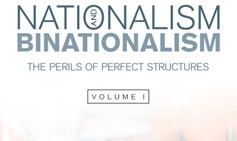
A Zionist State, a Binational State and an In-Between Jewish and Democratic State
Written By: Sammy Smooha
In this article, reprinted from Nationalism and Binationalism: The Perils of Perfect Structures, Prof. Sammy Smooha presents three models of Israel's national character, focusing on Israel's identity as a Jewish and democratic state.
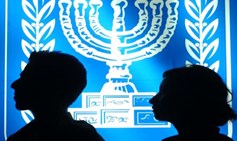
Who is Entitled?
Written By: Aryeh Eldad
The question of who is a citizen of Israel is tied to many issues in the forefront of debate in Israel: questions regarding the Jewish and democratic nature of the state, questions regarding conversion, and questions regarding the absorption of refugees and foreign workers into Israeli society. In this article, guest columnist MK Aryeh Eldad shares his views on who is entitled to be and who should be a citizen of the State of Israel.

Emigration from Israel – The Overlooked or Hidden Facts
An article by the Guttman Center for Surveys on the desire of young people from the Russian immigrant community in Israel to remain in Israel.

